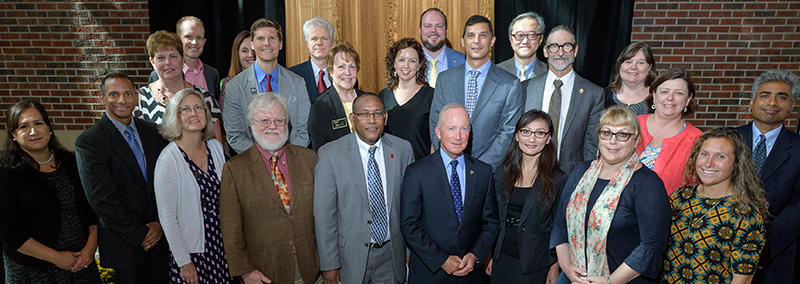Lyles School students to collaborate with USAID
It is a rare opportunity.
Lyles School of Civil Engineering students will assist in global research that aims to create long-lasting solutions for low-income countries.
In August 2018, Purdue University was awarded a five-year, $70 million grant from the United States Agency for International Development (USAID) to lead a multi-university consortium — titled Long-Term Assistance and Services for Research (LASER), Partners for University Led Solutions Engine (PULSE) — and build capacity of in-region higher-education institutions to devise evidence-based solutions to global developmental challenges.
Joseph Sinfield, associate professor of civil engineering and director of the College of Engineering Innovation and Leadership Studies Program, is a co-principal investigator on the effort — along with Arvind Raman, Andrea Burniske, Gary Burniske and Yuehwern Yih. Sinfield co-authored Purdue's bid to lead the consortium, which was selected from a pool of more than 100 proposals.
"We aim to employ innovation-science principles to understand the full scope of issues faced in lower-income countries," Sinfield says. "To properly address these challenges, we are developing methods to frame complex, multilayered problems. Our early work shows that socio-technical problems like improving basic education, health, water and food security involve literally hundreds of success factors spanning issues of commitment, awareness, motivation, leadership engagement, barriers and access, technology, resourcing and sustainability, among others. Our new models are beginning to capture this breadth of requirements."
The effort has already engaged a number of graduate and undergraduate students, giving them exposure to real-life needs and to ways engineers can help frame complex problems and develop responsive solutions. Sinfield says that the work is particularly exciting for civil engineers who are inherently involved in building communities, developing sustainable environments and creating networked infrastructure.
Already on the team with Sinfield are civil engineering PhD students Romika Kotian and Maggie Busse. Kotian says she never dreamed she would be part of such an ambitious undertaking when she came to Purdue.
"It was very surprising when I was told about the award, and that I could be involved. But I am so happy to be a part of it," Kotian says. "I didn't think I'd get a chance to have such a major impact on the world as a student."
The five-year project, which will engage stakeholders in multiple regions around the world, is getting started with the consortium's first international conference in the spring of 2019. The event will take place in Uganda and will focus on improving systems for health care, water, basic education and food security in East Africa. Preparation for this activity is providing a real-world focus for a course called Breakthrough Thinking for Complex Challenges, which serves as a capstone to the College's new Minor in Innovation and Transformational Change — also led by Sinfield. In addition, a number of undergraduates interested in the project have been able to get involved by participating in the student-run organization called IMPACT, short for Innovation Methods for Purdue Advanced Collaboration Team. IMPACT helps organizations on- and off-campus employ the best practices of innovation science to address their key challenges.
Winning the USAID grant illustrates Purdue's stature in international development research.
"Our standard for global activities is that they have real-world effects at significant scale," said Purdue President Mitch Daniels during the grant announcement ceremony. "This project more than meets that test."
Purdue's partners in the consortium are two universities in Indiana — Indiana University and the University of Notre Dame — as well as Catholic Relief Services and Makerere University in Uganda.
The consortium has a corporate advisory board that includes General Electric Energy, General Electric Healthcare, Dr. Reddy's Labs, Dow Agrosciences, Cargill, Land O'Lakes, Procter & Gamble, PepsiCo, Cisco, Infosys, Tetra Tech, Chemonics, Hewlett Packard Enterprise and Whirlpool Corp.
PULSE includes a faculty fellows program that will recruit faculty from each consortium member university as experts in food security, water, global health, infrastructure, microfinance policy and other topics to assist with various aspects of the center and network activities.

Purdue University was selected to lead a multi-university consortium to tackle issues facing developing countries. Lyles School of Civil Engineering Associate Professor Joseph Sinfield is one of five co-PI's on the program.
